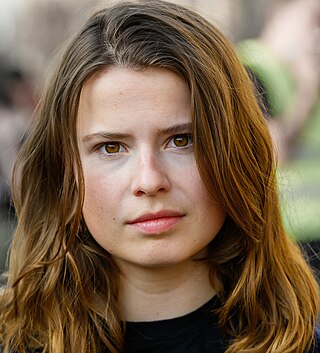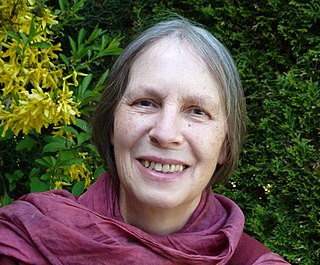Related Research Articles

The cittern or cithren is a stringed instrument dating from the Renaissance. Modern scholars debate its exact history, but it is generally accepted that it is descended from the Medieval citole. Its flat-back design was simpler and cheaper to construct than the lute. It was also easier to play, smaller, less delicate and more portable. Played by people of all social classes, the cittern was a popular instrument of casual music-making much like the guitar is today.

Alice Sophie Schwarzer is a German journalist and prominent feminist. She is founder and publisher of the German feminist journal EMMA. Beginning in France, she became a forerunner of feminist positions against anti-abortion laws, for economic self-sufficiency for women, against pornography, prostitution, female genital mutilation, and for a fair position of women in Islam. She authored many books, including biographies of Romy Schneider, Marion Dönhoff, and herself.
Maren Niemeyer is a German journalist, documentary filmmaker and cultural manager

Carmen Thomas is a German journalist, radio and television presenter, author and lecturer. On television, she was the first woman to present the ZDF's das aktuelle Sportstudio. She worked for public radio, running Hallo Ü-Wagen, a weekly travelling talk radio show for two decades. In 1990 Forbes named her one of the 100 most influential women in Germany.

Brigitte Kronauer was a German writer who lived in Hamburg. Her novels, written in the tradition of Jean Paul with artful writing and an ironic undertone, were awarded several prizes, including in 2005 the Georg Büchner Prize, in 2011 the Jean-Paul-Preis and in 2017 the Thomas Mann Prize.
Das Volksrecht was a left-wing newspaper published from Offenbach am Main, Weimar Germany between 1925 and 1933. Initially it was an irregular publication of the communist city council group, but in 1928 it became a local mouthpiece of the Right Opposition. It was published on a weekly basis until the National Socialist takeover in 1933.
Freies Volk was a newspaper published daily from Düsseldorf, West Germany 1949-1956. Freies Volk was printed at Freier Verlag GmbH, Ackerstrasse 114.
Wilhelm Ernst Barkhoff was a German solicitor, founder of anthroposophically oriented alternative banking, the GLS Bank, reformer of the German welfare system and inspirer of the movement for Ethical banking.

Angela Roy is a German actress and director.
The Suhl card reader case deals with the 1956 verdict on Charlotte Marquardt. A court in Eastern Germany had condemned Marquardt, an amateur psychic and cartomancy practitioner, to twelve years' imprisonment. The verdict referred to so called Kriegs- und Boykotthetze, incitement to war and boycott: Marquardt had provided favorable forecasts for families preparing to leave East Germany, and when arrested, was in possession of an astrological handbook including a horoscope with a positive outlook on Western Germany.

Clara Bohm-Schuch was a German politician of the Social Democratic Party.
The Vogelheimer Klinge is an approximately 280,000 year old flint tool, discovered in 1926 during the construction of the Rhine-Herne Canal in Vogelheim, north of the city of Essen. In older publications it is also known as the Klingenschaber von Vogelheim. It was long considered to be the oldest accurately dated artifact in North Rhine-Westphalia and can be found in the de:Ruhr Museum.

Luisa-Marie Neubauer is a German climate activist. She is one of the main organisers of the school strike for climate movement in Germany, where it is commonly referred to under its alternative name Fridays for Future. She advocates a climate policy that complies with and surpasses the Paris Agreement and endorses de-growth. Neubauer is a member of Alliance 90/The Greens and the Green Youth.

Enno Stephan (1927–2018) was a German journalist and historian. He was conscripted into the German military at the age of 15 during the Second World War and subsequently became a prisoner of war. He was sent to work at the Abbey of Fontenay in France before starting a career in print and later radio journalism.

Jürgen Reulecke is a German historian and emeritus professor.

Christa Ludwig is a German teacher, writer and editor, specializing in books for young people. She taught at Schule Schloss Salem before turning to freelance writing. After books and series related to horses, a novel about the Jerusalem years of Else Lasker-Schüler was published in 2018. She received the Eichendorff-Literaturpreis.
Rolf Fritz was a German art historian. His research focused on German art from the Middle Ages to the 19th century, especially on the art and cultural history of Westphalia, as well as on various genres of arts and crafts.
Panorama is the oldest German current affairs television magazine, first aired on 4 June 1961. It is produced by Norddeutscher Rundfunk (NDR), and is aired every third week on Thursdays at 21:45, alternating with Monitor and Kontraste by Das Erste. Anja Reschke has been moderator since 2001. It became popular, with often controversial topics leading to broader discussions and legal consequences.
Georg Ludwig Kinsky was a German musicologist.
Bettina "Tine" Plesch was a German music journalist and feminist author.
References
- 1 2 3 "Botschafterin eines nahezu vergessenen Instruments" (in German). Augsburger Allgemeine. 2007-11-09. Retrieved 9 April 2010.
- ↑ "Das Samenkorn ist aufgegangen" (in German). Freies Wort. 2009-09-29. Retrieved 16 April 2010.[ permanent dead link ]